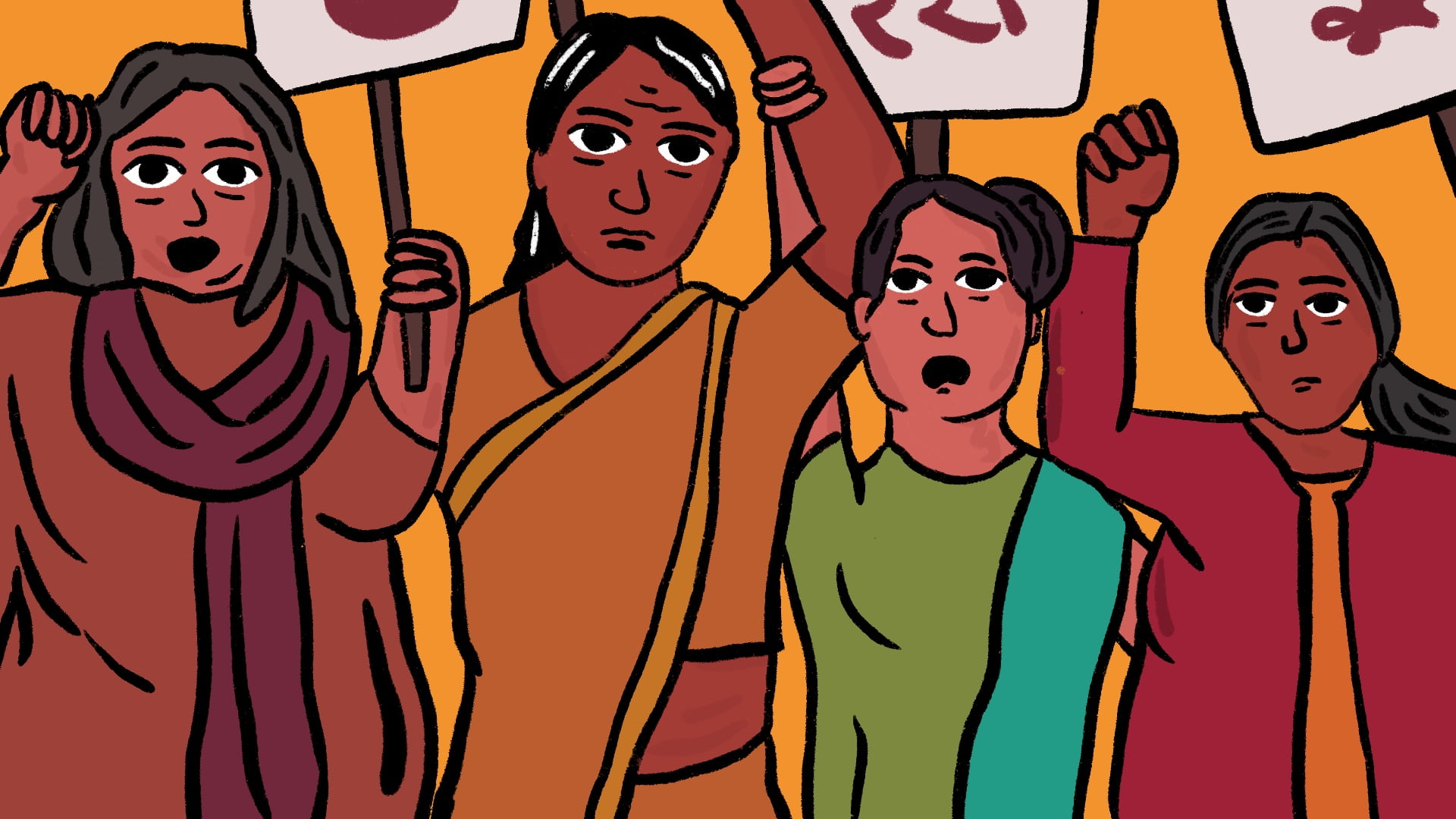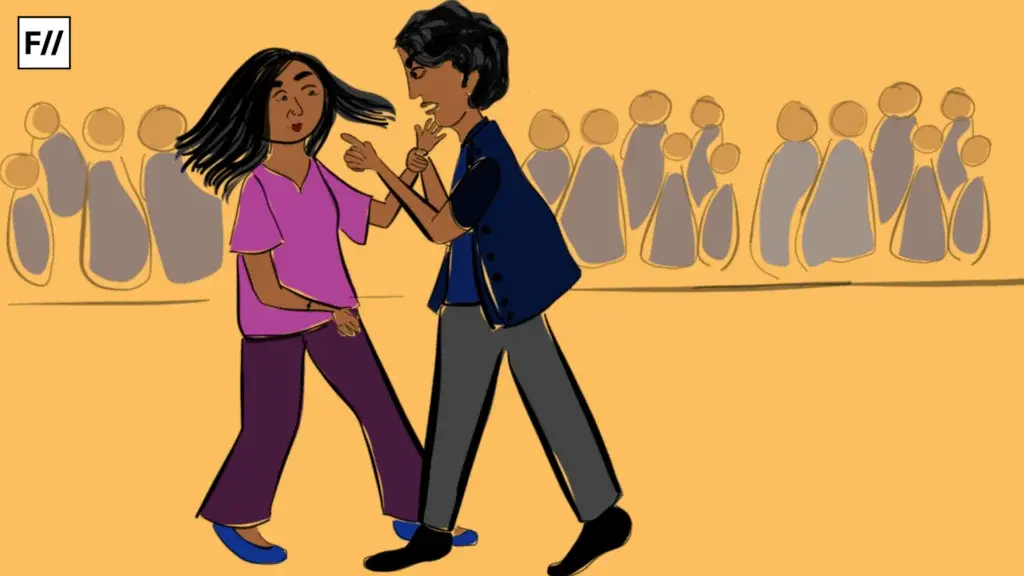Dhriti (name changed), a Dalit woman from Madhya Pradesh, was raped by her employer, with her little daughter sleeping beside her while her husband was away. The rapist threatened to kill her if she ever spoke of the incident to another person, even to her husband.
When Dhriti mustered the courage to narrate the horrifying incident to her husband, instead of supporting her, he blamed her for the incident. He said, “You have shamed us in front of the village. How will we face people? What will we do now? You must go to your parent’s house.” Unable to go to her parents’ place, Dhriti left for her in-laws’.
While they insisted that a police complaint be filed, she was also subjected to a great degree of shame. “We have a very bad daughter-in-law who has shamed us in front of the whole village,” said her father-in-law.
Even though banned, the usage of two-finger tests in medical examinations of rape survivors is rampant across some countries in South Asia.
What followed was an ordeal of persistent harassment, threats and intimidation by various actors throughout the process of her seeking legal recourse. The accused and his allies would show up at different places – including the police station and hospital – in an attempt to hinder reporting.
The police, colluding with the accused, delayed filing the FIR. This was coupled with their unwelcome remarks and interrogation about the specifics of the assault. “If they try to kill you, then you will have to die,” responded the police when Dhriti asked for a vehicle to be arranged as protection from the accused.
Dhriti’s harrowing testimony features in ‘Sexual Violence in South Asia: Legal and Other Barriers to Justice for Survivors‘, a report which identifies a multitude of barriers faced by survivors of sexual violence across six countries in South Asia – India, Bangladesh, Nepal, Maldives, Sri Lanka, and Bhutan. Dhriti’s story resonates with that of many other rape survivors and their battles with the system, their families, their community in the aftermath of rape.
What are the barriers faced by rape survivors in South Asia?
The findings of the report reveal how stigma and victim blaming are two key factors which operate at multiple points, with varying degrees, and from different actors. This is deeply rooted in the refusal to believe women’s and girls’ accounts of rape, which in turn leads to significant delays in reporting, and contributes to low reporting rates for rape.
In instances where survivors do decide to proceed along a legal path in the pursuit of justice, they are confronted with a whole array of procedural loopholes throughout the system. Police failing to act promptly in filing cases is a primary obstacle faced by survivors. Dhriti’s experience is extremely common, with many survivors across South Asia facing similar ordeals within the police system. Police reluctance to file an FIR and creating delays in registering a case are some of such barriers.
Another alarming finding from the report points to the continued use of two-finger tests in medical examinations of rape survivors across some countries in South Asia. The two-finger test or the “virginity” test involves medical practitioners inserting two fingers into the vagina of the rape survivor to determine whether the hymen is broken and laxity of the vagina. Ruled as unscientific and intrusive, the test continues to hold significance in medical examinations of rape survivors in determining whether they are “habituated to sex”.
Derogatory questions about the survivor’s sexual history, including her relationship with the perpetrator, by judges and lawyers are central to secondary victimisation during court trials.
Numerous survivors interviewed for the study from India, including Dhriti, reported undergoing the test during their medical examination. Insights from expert interviews in Nepal and Sri Lanka inform us of its continued use in medical examinations of rape survivors and its subsequent significance in court trials. While the two-finger test is officially banned in India and Bangladesh, there is no specific ban on the test in Sri Lanka and Nepal.
Secondary victimisation during court trials is another key and recurring reality in the lives of rape survivors. Derogatory questions about the survivor’s sexual history, including her relationship with the perpetrator, by judges and lawyers are central to this victimisation. The trauma that this ordeal brings forth has severe bearings on the survivors’ lives and they are left with no choice, but to abandon the case.
Closely linked to this revictimisation by courts and the subsequent dropping of cases is the low conviction rates across these countries. As per latest available data, out of the six countries studied, Bhutan has the highest conviction rate in rape cases at 64% (2009-2020), although this needs to be viewed within the context of the extremely low reporting base. Following behind is Nepal at 34.8% (2016-2017) and India at 27.12% (2019). At the bottom is Sri Lanka at 3.8% (2019), and Bangladesh at just 3% (2002-2016, unofficial estimate). Comparable data is not available for the Maldives.
Also read: The Need To Radically Change The Language Around Rape
These data points are critical in highlighting the impunity of perpetrators across the South Asian region, which is enabled by inconsistencies within the justice system, stigma of being a rape survivor, and most importantly the social status of the perpetrator and the survivor.
Why focus on socially excluded communities?
Survivors from excluded communities, based on ethnicity, religion, caste and class, are subjected to compounded layers of discrimination when accessing the criminal justice system. The report throws light on the skewed nature of justice that the marginalised are at the receiving end of.
Survivors interviewed for the study reported that ingrained caste discrimination plays a big role in their inaccessibility to the justice system.
Police and other key actors of the justice system are more likely to not believe survivors from socially excluded communities, as reiterated by the country-experts who were interviewed. A particularly striking issue faced by ethnic minorities in Sri Lanka, Nepal and Bangladesh is the linguistic barrier in understanding the proceedings, coupled with poor translation services, and apathetic attitudes of officials towards the linguistic minorities – often pushing them further to the margins.
Survivors from marginalised communities face intimidation and threats from perpetrators who are mostly from dominant caste/class sections of their villages and who subject them to physical violence, death threats and social ostracisation.
Furthermore, survivors from excluded communities face intimidation and threats from perpetrators who are mostly from dominant caste/class sections of their villages and who subject them to physical violence, death threats and social ostracisation.
The impact of rape on the lives of survivors from excluded communities is deep-seated, especially in countries of India, Bangladesh and Nepal. Survivors reported being negatively impacted in many ways – from deteriorating emotional and mental health, loss of livelihood to relocating to new cities with their families for fear of their safety in their homes.
Are the support services for rape survivors adequate in South Asia?
In all of the countries included in the study, there is a severe dearth in the availability of support services for rape survivors. This includes insufficient shelters, clear absence of psycho-social care services by the government, and poor implementation of victim and witness protection schemes.
Country-experts from Maldives reported that the shelters available in the country are seldom functional and this was a problem echoed in other countries. As far as witness and victim protection is concerned, insights from experts and first-hand accounts of survivors point to the poor implementation of witness protection schemes. Survivors are often left to fend for themselves even as they fear for their safety within their own homes.
What needs to be done moving forward?
Dhriti, whose case was not proven in court and the perpetrators released scot-free, said as a concluding remark, “If we get justice, then such incidents will not have to be repeated with other women.“
Each survivor may have her view on what constitutes justice. Some survivors stated speedy trials as justice. For some, conviction was justice. Many stated that they want more sensitivity and accountability from the system, from their communities and families.
Understanding justice from the perspective of survivors is critical to developing a survivor-centric approach towards addressing sexual violence. A survivor-centric approach must always seek to ensure accountability of the system and take concrete and consistent efforts to shift the onus of justice delivery from the survivors to the system.
Also read: ‘Most Rape Allegations Are False’ And 4 Other Myths Busted!
Governments need to adopt a comprehensive approach towards addressing the barriers to justice faced by rape survivors, including by addressing protection gaps in the law, improving police responses in cases of sexual violence, ensuring survivor-friendly medical examinations in rape cases, improving prosecution procedures and trials of sexual offences, and designing and funding holistic interventions to improve access to justice for survivors.
Evlyn Samuel is a consultant with Dignity Alliance International, a UK-based charity that invests in those that seek to ensure access to justice and inclusion for excluded communities and works towards achieving a more just and equitable society.
Divya Srinivasan is a human rights lawyer who works as Legal Advisor with Equality Now, an international human rights organisation which works to protect and promote the rights of women and girls across the globe.





Very well written and concluded. Facts and circumstances covered with good insights. This will definitely help in getting a brief understanding of the barriers faced by the victims and how prominent it is in South Asia.